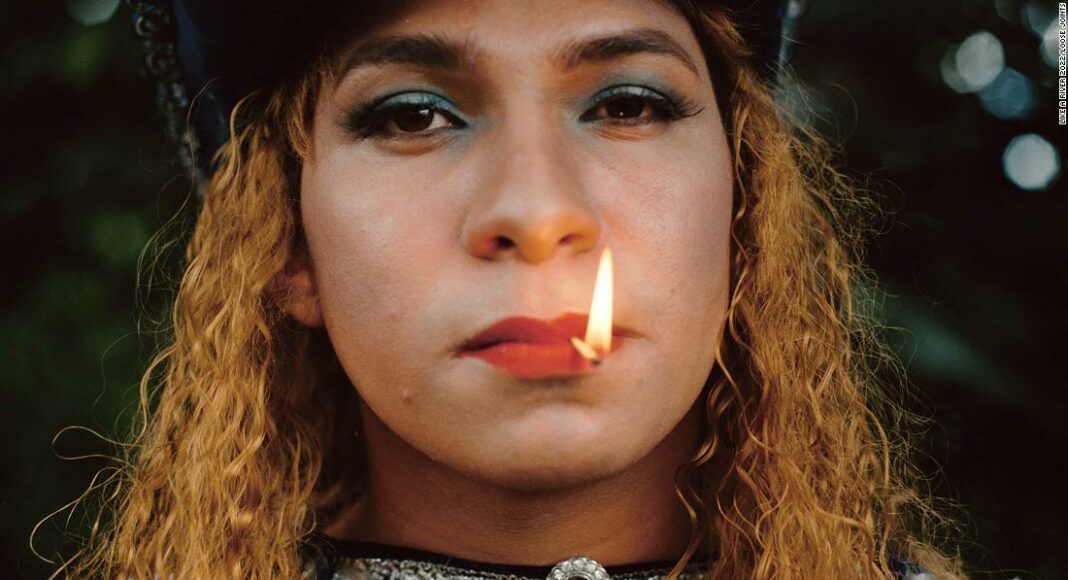Written by Oscar Holland, CNN
While eating dinner at a restaurant in Careiro, a small town deep in the Amazon rainforest, Daniel Jack Lyons was unexpectedly approached by a local drag performer, Wendell.
Two days earlier, the American photographer had met with young community leaders in the hope that some might participate in a new project exploring the lives of marginalized youths in the remote Brazilian region. Word had quickly spread.
“He came up to me and said: ‘You’re the photographer, I’m a drag queen and you’re photographing me on Thursday,'” Lyons recalled in a phone interview.
The pair met up, and the resulting portrait — Wendell staring defiantly at the camera with a lit matchstick in his mouth — went on to become the standout image in Lyons’ dreamy new coming-of-age series, “Like a River.” But as both a photographer and a trained anthropologist, Lyons appears more interested in the human stories behind his pictures.
“Wendell does drag performances, but he’s also caring for his mother’s small business selling churrasco (grilled meat) at night in the market,” he said. “She’s quite ill, and he’s taken over. So, it’s a very sensitive thing: He doesn’t want to do drag and (have any resulting discrimination) negatively affect the business, which is what they’re surviving on.
“So as a way of overcompensating, he has become this ‘mother’ to all the non-binary, trans and queer kids in the town,” Lyons added, recounting how Wendell opened his home to struggling teens and has helped transgender youths access hormone therapy in the nearest city, Manaus.
About half of the subjects in Lyons’ new book identify as trans, non-binary or “queer in some way,” said the photographer. Credit: Like a River 2022/Loose Joints
Basing himself in Careiro and the nearby Tupana River for up to eight weeks at a time, Lyons went on to photograph dozens more young people for the series, which is currently on display at the Rencontres d’Arles photo festival in France. About half of the subjects in his accompanying book are trans, non-binary or “queer in some way,” said the photographer, who himself identifies as queer. Their stories contain tales of turbulent gender transitions and family friction. One person Lyons spoke to for the project had been disowned by their wife and parents, and separated from their son, after coming out as trans. The photos were also taken against the backdrop of social stigmas in a country where homophobic hate crimes are on the rise and LGBTQ rights appear increasingly under threat (Brazilian president Jair Bolsonaro, who once told Playboy magazine that he would be “incapable of loving a homosexual son,” has voiced disapproval of the country’s same-sex marriage laws).
Yet, the overriding spirit of Lyons’ images is one of resilience.
“There was a struggle among everybody I worked with, for sure,” he said. “But it’s almost like discrimination is just understood in a tacit way. It’s the undercurrent, it’s there, but as I was becoming friends with people, there was a lot of positive discussion.
“There was a (sense of) perseverance — celebrating the fact that they can walk around this town and not care what people think.”
Intersectional identities
Borrowing its title from a Brazilian poem of the same name, “Like A River” depicts not only the region’s LGBTQ communities, but other groups “living on the margins,” as Lyons puts it. His intimate images capture teens involved in arts and music subcultures, as well as indigenous youths with complex “intersectional identities.”
The photographer also turned his lens on young land activists, with environmental threats serving as a recurring concern among his subjects. He said that fear of illegal mining and deforestation has noticeably grown in Careiro since he began the project in 2019.
Lyons also turned his lens on the region’s environment, which he says is increasingly under threat. Credit: Like a River 2022/Loose Joints
“There’s obviously a lot of discrimination based on being queer, but I think the bigger threat for people is that Bolsonaro has created this wild west in the Amazon. There is a lot of fear that loggers and illegal miners can come into a community,” he added, referring to recent reports of miners attacking indigenous villages in the hunt for gold and other resources.
Lyons, who has previously produced series on marginalized youths in Mozambique and Ukraine, treats portraiture as an act of collaboration — and his subjects as friends.
The photographer focuses on building relationships before picking up his camera. He usually won’t capture people the day he meets them — and he gives collaborators power over where and how the shoots take place, including what they wear and how they pose.
“It’s not traditional photojournalism where you swoop in, take pictures and swoop out,” explained Lyons, who said he is still in touch with many of the people featured in “Like a River.”
“It was much more than that. I wanted to focus on engaging with people and really cherishing those intimate moments they shared with me.”
“Like a River” is on show at the Rencontres d’Arles photo festival until Aug. 28, 2022. A book of the series, published by Loose Joints, is available now.
Ειδήσεις
ΠΗΓΗ




